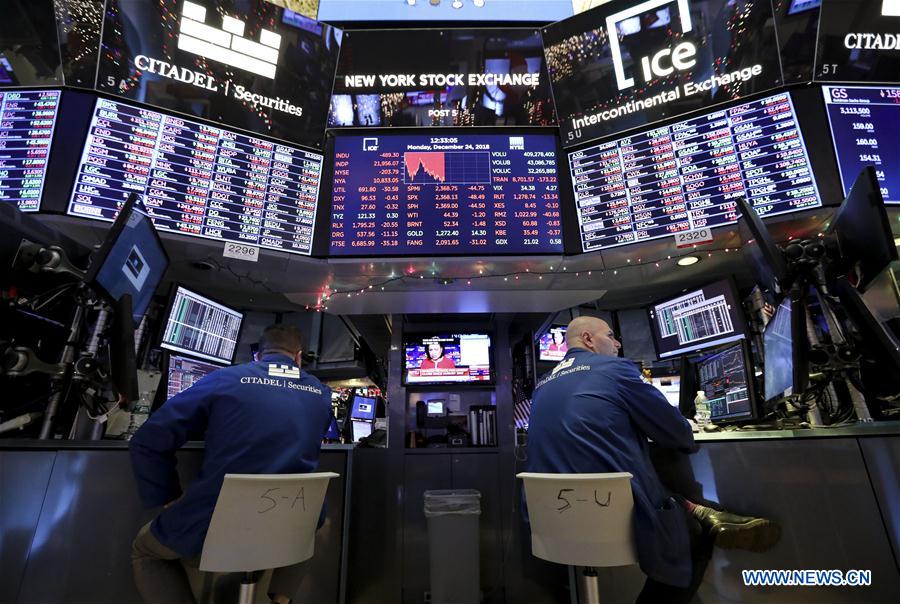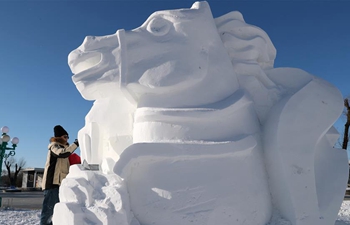
Traders work at the New York Stock Exchange in New York, the United States, Dec. 24, 2018. U.S. stocks plunged on Monday, with most of the major indices booking their worst Christmas Eve decline, extending their huge losses in the previous week's rout. The Dow Jones Industrial Average slumped 653.17 points, or 2.91 percent, to 21792.20. The S&P 500 decreased 65.52 points, or 2.71 percent, to 2,351.10. The Nasdaq Composite Index slid 140.08 points, or 2.21 percent, to 6,192.92. (Xinhua/Wang Ying)
NEW YORK, Dec. 24 (Xinhua) -- U.S. stocks sank on Monday, with all the three major indices erasing over 2 percent at the close, as invest sentiment was dented by the turmoil in Washington amid uncertainties.
The Dow Jones Industrial Average slumped 653.17 points, or 2.91 percent, to 21,792.20. The 30-stock index is now more than 18 percent lower than its recent highs, creeping closer toward a bear-market territory.
The S&P 500 decreased 65.52 points, or 2.71 percent, more than 20 percent lower from its recent intraday highs in September, slipping into a bear market.
The Nasdaq Composite Index slid 140.08 points, or 2.21 percent, to 6,192.92. The tech-heavy index suffered another steep sell-off after dipping into bear market last Friday.
Most of the major indices booked their worst Christmas Eve decline and the U.S. equities are on pace for their worst December since 1931, during the depth of the Great Depression.
The Cboe Volatility index, widely considered the best fear gauge in the stock market, surged 19.79 percent to 36.07 on Monday.
The market responded to the turmoil in Washington, according to some experts.
"News generated gyrations at the moment and most investors were inclined to sell when approaching the end of the year," John Monaco, a trader at Wellington Shields & Co. LLC, told Xinhua.
Multiple reports said U.S. President Donald Trump is discussing to remove Jerome Powell from his position as chairman of the Federal Reserve after the central bank announced last week to hike the interest rate for the fourth time this year.
The situation was more complicated when Trump on Monday criticized the U.S. central bank on Twitter.
"The only problem our economy has is the Fed. They don't have a feel for the Market," the president tweeted.
Meanwhile, U.S. Treasury Secretary Steven Mnuchin called the heads of the six largest U.S. banks in an attempt to stabilize the market over the weekend, but the move seemed only to raise new concerns about the economy.
The moves spooked the already volatile market as investors were anxious that their gains would vanish and entered a risk-off mode.
Trading volume was light on Monday during a shortened session ahead of Christmas.
Markets have been rattled throughout the year amid fears of rapid interest rate hikes. Such concerns grew more credible over the past month as growth expectations retreated.
Rising interest rates can be a hurdle to smaller companies that carry a high proportion of debt, so any sign that the Fed plans to continue to raise rates each quarter could weigh on corporate sentiment.
"Stocks trade up or down based on past stock price increases or decreases and based on forward earnings after careful analysis that includes demand for product," Monaco said, adding that it will be clearer and more definitive as to what traders will be doing after the holidays.
U.S. stocks posted huge loss in the week ending Dec. 21 as investors digested the central bank's latest rate hike decision and a batch of economic data.
For the past week, the Dow shed 6.9 percent, the S&P 500 erased 7.1 percent, and the Nasdaq declined 8.4 percent. The week saw the worst performance for the Dow and the Nasdaq since 2008, and the S&P 500's worst performance since 2011.











